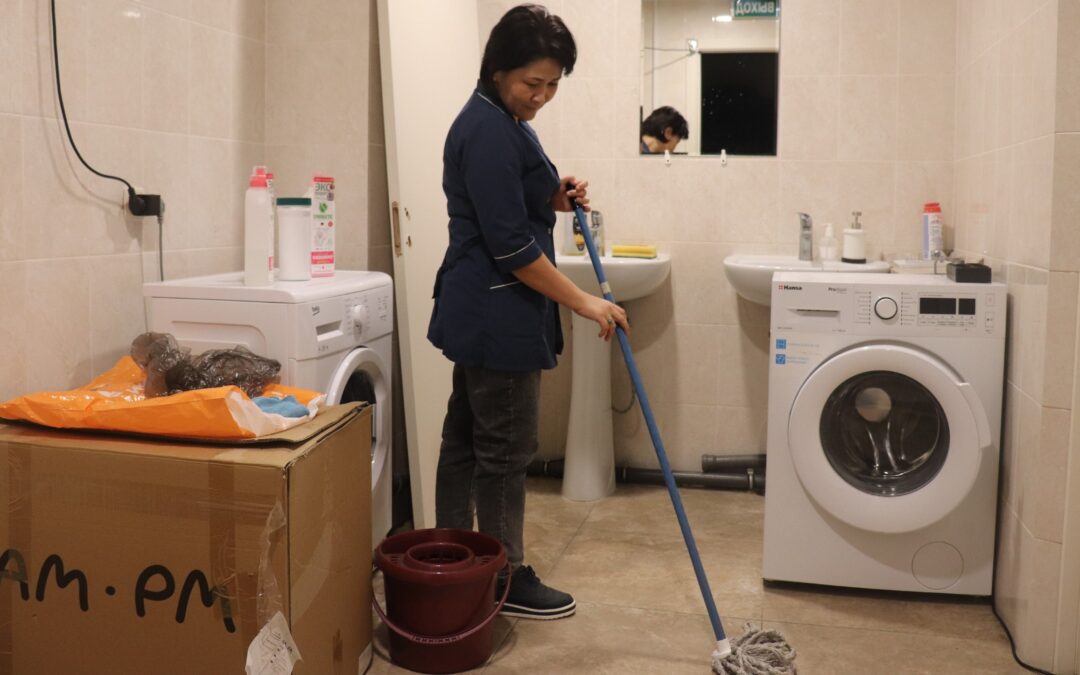Women and workers from marginalized communities suffered disproportionately from the impact of the COVID-19 pandemic and a new survey details the effects on Kyrgyz migrant workers in Russia.
The survey of almost 300 Kyrgyz women who are dependent on precarious, low-wage jobs in Russia finds that the pandemic exacerbated migrant workers’ vulnerability to economic precarity and that women migrant workers reported brutal conditions on the job, including sexual violence. Almost half a million Kyrgyz women were working in Russia in 2021.
The survey compiled data from Kyrgyz women working in Russia in caregiving, catering, domestic and janitorial work and garment manufacturing and retail sectors in 19 Russian cities, including Moscow, Novosibirsk and Yekaterinburg. The survey was conducted by local non-governmental organization Insan-Leilek Public Foundation, a long-time partner of the Solidarity Center in advocating for the rights of migrant workers from Kyrgyzstan.
“The pandemic played such a cruel joke on us,” said a survey respondent. (For their protection, respondents are quoted anonymously.) “They start with migrants; they are the first to be fired.”
Respondents reported increased health precarity during the pandemic due to limited non-resident medical services and higher virus exposure while working service jobs, as well as increased financial precarity following mass service-sector and retail layoffs. Without formal written work agreements—common for migrant workers and a violation of their rights under Russian labor law—many lost their incomes without compensation, which increased their food insecurity and other economic hardships.
Rampant Worker Rights Violations, Including GBVH
- Many respondents reported health and safety violations and loss of dignity at work due to migrant status, unregulated use of chemicals and rampant sexual or other gender-based violence and harassment (GBVH) by employers, supervisors and customers.
- Sexual violence was common. Fourteen percent of those surveyed reported rape; two were victims of gang rape in their workplaces.
- Sexual harassment was widely reported. Forty percent of participants said they were subject at work to comments about their bodies, obscene jokes and sexually suggestive gestures. Twenty percent reported violation of their personal boundaries, such as men touching their waist, breasts, buttocks and other parts of the body.
- More than half of the respondents were working without contracts, leaving them without legal protection and vulnerable to the whims of employers—many of whom reportedly refused to sign employment contracts at the time of hiring.
- More than two thirds of the women reported encountered discrimination at the workplace. Of that number, two thirds attributed it to their migrant status; half said it was because of their gender.
- Many respondents reported wage and working conditions in violation of Russia’s labor code, including a quarter of respondents who suffered wage payment delays, half who did not receive overtime pay and four-fifths who were denied paid sick and holiday leave.
- Half of respondents reporting rights violations did not know where to turn for help or were afraid to talk about it.
“I don’t want to seek help and it’s impossible to seek help,” said a survey respondent who reported being touched sexually at work but feared deportation if she reported the abuse.
Based on survey findings, Insan-Leilek made recommendations to the governments of Kyrgyzstan and Russia to better protect migrant Kyrgyz women, including a greater role for the Trade Union of Migrants of the Kyrgyz Republic, pre-departure worker rights training for those migrating to Russia for work and the creation of migrant crisis centers to provide emergency shelter as well as legal, medical and psychological aid. To address GBVH suffered by women Kyrgyz migrants in the world of work, union women are demanding ratification of UN International Labor Organization Convention 190 (C190).
Many Kyrgyz citizens are forced to move to other countries to earn their livelihoods because of limited economic opportunities in Kyrgyzstan, where a third of the population lives below the national poverty line and migrant remittances in 2022 represented 30 percent of the country’s GDP.

